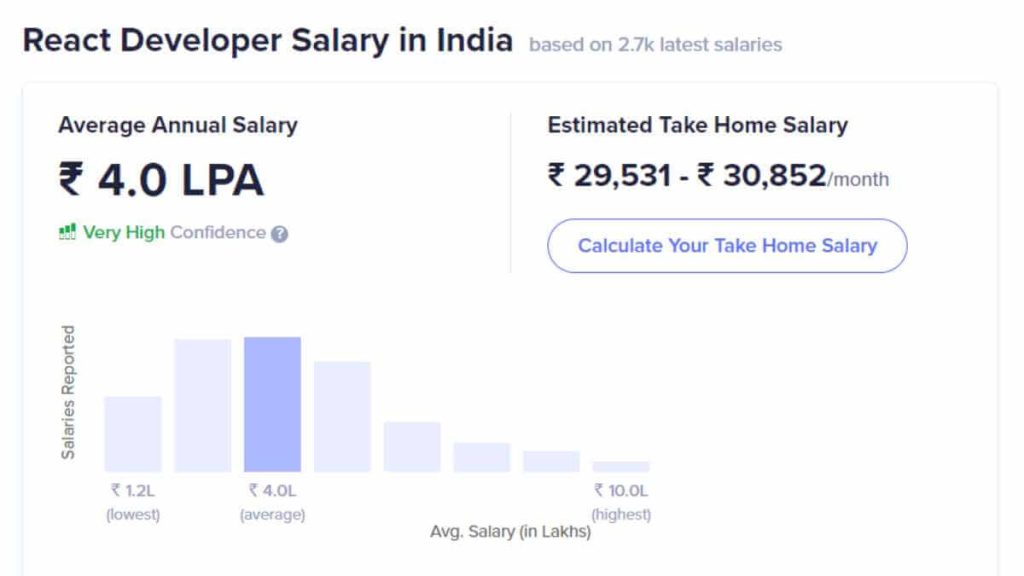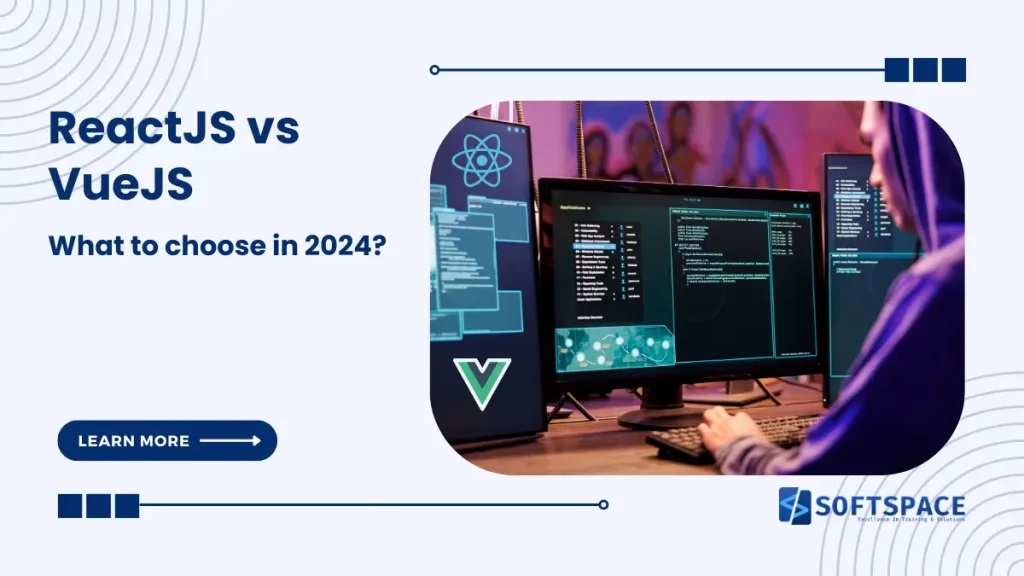Are you curious about the expertise essential for a React developer? JavaScript’s ReactJS/React framework serves as a popular tool for building fluid, responsive user interfaces. The need for React developers has soared in recent years along with its rising popularity.
But then what core competencies are essential to excel as a React developer? In this blog, we will explore and answer everything related to the question “How to become a React Developer?”.
Hence, whether you are a newbie trying to launch a career in React JS development or an experienced developer looking to upskill, this blog will serve you with essential insights to help you reach your objectives. Let’s get rolling!
Table of Contents
Who is a React Developer?
It’s hard to envision a future without websites and online apps in the current digital era. And at the heart of these digital advancements is the strength of React. So who exactly is a React developer, and what exactly do they do?
A software engineer who focuses on utilizing React, a well-known JavaScript library, to create user interfaces and single-page apps is known as a React developer. They are in charge of leveraging React and other front-end technologies like HTML, CSS, and JavaScript to develop and create sophisticated online apps.
As a result of their proficiency with a variety of back-end technologies and databases, React engineers can create web apps that are reliable, scalable, and fast.
Whether you are an experienced web developer or are just beginning your career in technology, learning React may open up a world of fascinating options for professional progression in the ever-changing digital sector.
How to become a React Developer with proper skills?
If you are considering becoming a React developer, you’re in luck. Throughout the years, there has been a steady rise in the need for React developers as more businesses seek qualified programmers who can create scalable and user-friendly online apps.
To become a React developer, you need a combination of technical and soft skills. Here’s a list of essential skills:
JavaScript
JavaScript is the foundation of React development. You should have a deep understanding of its core concepts, including variables, data types, functions, loops, and conditional statements. Knowledge of advanced concepts like closures, promises, and async/await is also important.
React
React is a JavaScript library for building user interfaces. You should be familiar with key React concepts such as components (functional and class-based), JSX (JavaScript XML), state, props, and how to manage the component lifecycle. Hooks like useState, useEffect, useContext, etc., are essential for modern React development.
HTML/CSS
HTML (Hypertext Markup Language) is used for structuring web content, while CSS (Cascading Style Sheets) is used for styling and layout. You should understand HTML tags and attributes, CSS selectors, properties, and how to apply styles to HTML elements.
Version Control/Git
Git is a distributed version control system used to track changes in code. You should know how to create and manage repositories, create branches, commit changes, merge branches, and work collaboratively with others using Git.
Node.js and npm
Node.js is a JavaScript runtime that allows you to run JavaScript on the server side. npm (Node Package Manager) is used for managing packages and dependencies in Node.js applications. You should understand how to work with Node.js, install packages using npm, and run scripts.
Package Management
Package management involves managing dependencies and libraries in your project. You should be comfortable with package.json, where you list project dependencies, and understand how to install, update, and remove packages using npm or yarn.
React Router
React Router is a library for handling client-side routing in React applications. You should know how to set up routes, create navigation links, and handle route parameters and redirects.
State Management
For larger applications, state management libraries like Redux or Mobx may be necessary. You should understand how to set up and use these libraries to manage the global application state effectively.
API Integration
React applications often communicate with backend services or APIs to fetch and send data. You should know how to make HTTP requests using libraries like Axios or the built-in fetch API and handle responses, including error handling and data parsing.
Front-End Build Tools
Build tools like Webpack and Babel are used to bundle, transpile, and optimize your code for production. You should be able to configure these tools to suit your project’s needs.
Debugging
Proficiency in debugging is essential for identifying and fixing issues in your code. You should know how to use browser developer tools and React DevTools to inspect and debug components, states, and props.
Testing
Testing is crucial for ensuring the reliability of your React applications. Learn how to write unit tests for components and integration tests for the overall application using testing frameworks like Jest and Enzyme.
Responsive Design
Understanding responsive design principles and using CSS frameworks or libraries like Bootstrap, Material-UI, or CSS Grid can help you create layouts that adapt to different screen sizes and devices.
Performance Optimization
Performance is critical for user experience. Techniques like code splitting (for lazy loading), memoization (caching expensive calculations), and optimizing rendering can improve your React application’s speed and efficiency.
Webpack and Babel
Webpack is a module bundler, and Babel is a JavaScript compiler. You should know how to configure and use these tools to handle JavaScript modules, transpile code, and bundle assets.
Command Line
Proficiency in the command line interface (CLI) is essential for running scripts, managing project dependencies, and performing various development tasks efficiently.
Problem-Solving
Strong problem-solving skills are crucial for debugging and finding efficient solutions to coding challenges. Debugging skills involve identifying issues, understanding error messages, and tracing code execution.
Soft Skills
Communication skills are vital for collaborating with team members, including designers, product managers, and other developers. Effective teamwork and clear communication ensure that the development process runs smoothly.
Learning and Adaptability
The field of web development is dynamic, with new tools and libraries emerging regularly. Being open to continuous learning and adapting to new technologies is essential to stay competitive as a React developer.
Project Management
Understanding project management concepts, such as Agile methodologies (Scrum, Kanban), helps you work effectively within a team and deliver projects on time and within scope.
React Developer Salary in India
The average salary for a React developer in India ranges between ₹1.2 Lakhs to ₹11.0 Lakhs with an average annual salary of ₹4.0 Lakhs. According to Glassdoor, the national average salary for a ReactJS Developer is ₹5,00,000 per year in India.

React Developer Salaries in Indian Companies
However, the salary of a React developer depends on various factors like experience, location, job role, and skill set.
| Company | Experience Level | Salary |
|---|---|---|
| TCS | 1-4 Yrs | ₹4.7 L |
| CAPGEMINI | 1-5 Yrs | ₹7.1 L |
| COGNIZANT | 1-2 Yrs | ₹5 L |
| INFOSYS | 1-5 Yrs | ₹4.8 L |
| WIPRO | 1-3 Yrs | ₹4.5 L |
| HCL | 1-9 Yrs | ₹8.7 L |
| ACCENTURE | 2-6 Yrs | ₹10.2 L |
Based on the search results, the salaries offered by Indian companies to a React developer vary based on the level of experience. Here are the details:
- Entry-level positions: The average salary for an entry-level React developer in India ranges from ₹2,60,000 to ₹6,00,000 per annum.
- Mid-career positions: The average salary for a mid-career React developer in India is around ₹4,52,073 per annum.
- Senior positions: The average salary for a senior React developer in India is around ₹8,06,231 per annum.
- Veteran positions: The average salary for a veteran React developer in India is around ₹14,35,000 per annum.
As the world of technology continues to evolve at a breakneck rate, budding developers must pick a market segment with growing demands. React development is one such field of expertise. The go-to option for creating dynamic and interactive user interfaces is the well-known JavaScript package React.
Developing expertise in these skills, along with practical experience in building React applications, will make you a proficient React developer. Continuous learning and keeping up with industry trends are also crucial to stay current in this ever-evolving field.
The bottom line is that a career as a React developer can provide a broad spectrum of possibilities. The fields of front-end development, full-stack programming, mobile app development, UI/UX design, and technical writing are just a few of the many professions available.
Now is a terrific moment to begin refining your skills and exploring the countless employment prospects accessible in this thrilling industry due to the burgeoning demand for React developers.
Top Paying Industries for React Developers in India
- Recruitment – ₹8.0 Lakhs per year.
- Internet – ₹7.3 Lakhs per year.
- Financial Services – ₹5.8 Lakhs per year.
- IT Services & Consulting – ₹5.7 Lakhs per year.
- Software Product – ₹5.5 Lakhs per year.
We’ve looked at some of the core skills a successful React developer must possess in this blog. By honing these skills, you will be able to construct a fluid and receptive UI that will thrill people and contribute to the success of your ventures. Learning React is an excellent career investment, whether you are a new developer just getting started or a seasoned developer trying to diversify your skill set.
Keep in mind that learning is a continuous process as you progress with React. Keeping up with the most recent innovations in the React ecosystem is essential for sustaining competitiveness in the market since there will always be new methods and better strategies to master.
We bid you farewell and wish you the best of luck in your React journey. Keep learning, keep growing, and keep building amazing things with React!
With that, we say goodbye and wish you luck as you continue your React voyage. Keep picking up new skills, expanding your horizons, and using React to produce more innovative ideas! For further discussion on how to become a React Developer, you can always get in touch with us.

13+ Yrs Experienced Career Counsellor & Skill Development Trainer | Educator | Digital & Content Strategist. Helping freshers and graduates make sound career choices through practical consultation. Guest faculty and Digital Marketing trainer working on building a skill development brand in Softspace Solutions. A passionate writer in core technical topics related to career growth.




